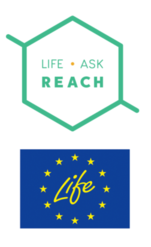Online Event:
Defining the path to a Non-Toxic Circular Economy
“Theory of Change” workshop as part of the Global Sustainable Chemistry Week
Thursday, 11 November 2021, 10:00-12:30 and Friday, 12 November 2021, 11:00-13:00
The EU Green Deal aims at “Transforming the EU’s Economy for a sustainable future” (p. 4). A resource efficient “clean and circular economy” (p. 7) capable of avoiding risk cycles of (legacy) substances of concern is a key component of this transformation. The Green Deal and subsequent policies (inter alia Chemicals Strategy for Sustainability, Sustainable Product Initiative) comprise various mechanisms and instruments tackling, inter alia, product design, digital product passport, consumer empowerment, and finance to facilitate this transformation. However, it lacks a clear understanding of how those building blocks create impact – from short-term to long-term – and which actors along the various supply chains need to provide which behavioural (change) contributions in this respect.
Taking the perspectives of decision-makers from industry, politics and society, this workshop will identify pathways and develop proactive strategies to pave the way for the implementation of the Green Deal. The workshop will be held in two sessions.
Why “theory of change”?
The term "Theory of Change" (ToC) describes the idea of how actors specifically interact to yield a desired change, e.g. a non-toxic circular economy. This includes identifying key influencing factors within complex systems and their interactions. Ultimately, contributions from various actors are necessary to trigger the transition towards the vision of a non-toxic circular economy; i.e. a change process "out of the niche and into the mainstream". Ideally, these actors need to be involved in the ToC-process. They approach the topic with different experiences, professional backgrounds, thinking styles and resulting perceptions. The ToC makes use of this plurality.
Agenda:
Session 1 on Thursday, 11 November 2021, 10:00-12:30
Visioning: The participants are invited to develop their vision of a non-toxic Circular Economy for the year 2050. The vision represents the goal to where the ToC should lead us. To develop this vision, the workshop uses specific formats allowing the participants to leave behind their conventional perceptions and thought patterns. This stipulates a common problem understanding and a jointly shared vision of the future. The joint process supports the participants in adopting new perspectives and sticking to them in the following steps.
Session 2 on Friday, 12 November 2021, 11:00-13:00
Backcasting: The participants take the perspective of the future target state (elaborated in the first session) and ask how it was possible to achieve this vision. They then analyse, which steps the actors have already taken and which they still have to pursue on the way to the desired target state by 2040, 2030 and so on.
About the Global Sustainability Week (November 8-12, 2021)
The workshop is part of the 1st Global Sustainability Week from 8th to 12th November 2021, hosted by the International Sustainable Chemistry Collaborative Centre (ISC3). With the Global Sustainable Chemistry Week, the ISC3 strives to raise international awareness for the concept of sustainable chemistry and the actors in this field. The Week takes place as an international, online event, including various workshop sessions, discussions, panels, lectures etc. by stakeholders and partners. with the goal to present the relevance and fascination of Sustainable Chemistry with a cross-sectoral approach. With the Global Sustainable Chemistry Week, the ISC3 offers a platform for all stakeholders to present their projects, business models, and research activities.
Find more on the ISC 3 Global Sustainability Week here: www.isc3.org/en/event/global-sustainable-chemistry-week-2021.html
Founded on the initiative of the German Federal Ministry for the Environment, Nature Conservation and Nuclear Safety (BMU) and the German Environmental Agency (UBA) 2017, the ISC3 engages in the transformation towards Sustainable Chemistry. The ISC3 acts internationally with focus on emerging economies and developing countries. The centre manages a knowledge platform and a network of stakeholders, contributes in political processes, conducts research, develops vocational and academic education, supports innovation and entrepreneurship, and offers advisory services. Connecting stakeholders from policy, industry, academia, and civil society is a key element of the transformation towards Sustainable Chemistry and therefore of ISC3’s work.
Data Protection Information
In accordance with the EU’s General Data Protection Regulation (GDPR) please note the following:
By registering for the "Theory of Change"-Workshop as part of the ISC3 Global Sustainable Chemistry Week 2021 you agree to have your data stored and processed by the ISC3 and sofia Darmstadt. Please note that during the "Theory of Change"-Workshop photos and videos might be taken for documentation purposes and social media communication. We kindly request you to reach out to us if you want your data to be deleted after the event.
Organisational Information:
The workshop is organised and moderated by the research group sofia in cooperation with BEF Germany.
Due to the ongoing Covid-19 pandemic, the Global Sustainable Chemistry Week 2021 will be an online event. The log-in data will be distributed to all confirmed participants in the week leading up to the event.
To participate, please fill in our registration form or send an email to isc3@sofia-research.com.

The EU LIFE AskREACH Project supports the realisation of this workshop. The goal of AskREACH is to improve the implementation of REACH Article 33 on the communication of SVHCs in articles along the supply chains and to the consumer.
The Project LIFE AskREACH (No. LIFE16 GIE/DE/000738) is funded by the LIFE Programme of the European Union

